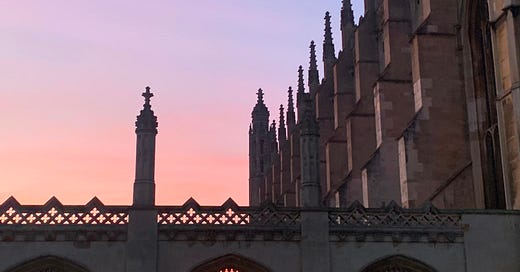Hello and welcome! Since very early this morning, at Stonehenge and elsewhere in the UK, people have been celebrating the summer solstice and the longest day of the year. It’s officially midsummer in the northern hemisphere, though Midsummer’s Day is 24th June, confusingly. Here on the Ladies’ Dining Society we’re celebrating our 100th post on Substack, so thank you all VERY much for subscribing, sharing, recommending and contributing to our discussions – reading and responding to your comments is my favourite part of writing on this platform. Below is our reading schedule for Gaudy Night by Dorothy L. Sayers, and read on for links to my top ten most-read, liked and commented-on posts since I started here in November 2023, all with no paywall this week. I really hope you enjoy them, and thanks for all you’ve done to make writing my weekly newsletter such an absolute pleasure.
Gaudy Night by Dorothy L. Sayers
Here’s our reading schedule for the coming weeks, always subject to last-minute adjustments of course! Gaudy Night is a long book but there’s so much in it to discuss. In 1935 when it was first published, it was praised by the Times Literary Supplement as ‘a discussion from every standpoint of the problem of Woman and the Intellectual Life’. The 20th Century Book Club is for paying subscribers to this publication, and you are very welcome to join us.
There’s a great list of other ‘readalongs’ in June/July on
’s Book Group Directory here, and I’m delighted to be included.‘If only one could come back to this quiet place, where only intellectual achievement counted […] then, one might be able to forget the wreck and chaos of the past, or see it, at any rate, in a truer proportion.’ (Harriet Vane in Gaudy Night, Chapter 1)
28/29 June Introduction to some of the background of this novel, and more about the stories of the women who belonged to the ‘Mutual Admiration Society’ along with Dorothy L. Sayers at Oxford.
5/6 July Gaudy Night discussion part 1 (chapters 1-11)
19/20 July Gaudy Night discussion part 2 (chapters 12 – 23)
Dorothy L. Sayers at Oxford
The first Oxford University graduation ceremony to award degrees to women took place on 14 October 1920. 27-year-old Dorothy L. Sayers was among the fifty celebrants that day, and she never forgot it. This short piece about the lasting effect of that day was inspired by a lovely post by
My Top Ten (in reverse order)
In November 2023, ‘Steamboat Ladies’ was the first post that got me a whole swathe of new readers. I wrote about the Oxbridge women who were given the nickname ‘Steamboat Ladies’ for the cheap ferry transport they used to to cross the Irish Sea to be awarded their rightful degrees in Dublin under a special scheme which ran from 1904 to 1907..
The following month, this wintry post about Sylvia Plath got over 100 ‘likes’ and comments. The term ‘domestic goddess’ might not have been prevalent in 1956, but there are shades of it in Plath’s touching determination to make her first married home in Cambridge a cosy, welcoming haven. In January 2024 I introduced myself properly, and ‘A good place to start’ got over 150 responses. Thank you!
I enjoyed writing this ‘circular’ post about the life and riverside home of the artist and writer Gwen Raverat, and exploring the 20th-century renaissance of the remarkable English novelist, Barbara Pym. Then in June last year, ‘Cambridge Bride’ also got a great response, and my snap of this happy couple at Baker Street tube station below went ‘viral’, in the nicest way, on Substack Notes.
In April last year readers generously gave me some brilliant suggestions for 20th-century novels set in Cambridge (over 200 likes and comments) which leads me to my top three most posts, each with over 300 responses, if I have calculated this correctly… drum roll, please.
To mark my first full year on Substack in November 2024, I wrote this: ‘I am incredibly grateful to all the wonderful readers and writers who have made perceptive comments and given me so much food for thought in the Comments section or via email. Our discussions have constantly inspired and bolstered me.’ I couldn’t put it better myself. My post celebrating 20th-century women writers struck a chord with many (including 59 new subscribers) which was wonderful. Hilary Mantel was one of the many writers for whom Virago Modern Classics was a game-changer.
‘I was living abroad when the list began. When I came back briefly in the 1980s - not a published writer then - the green spines were everywhere. I remember thinking that the world had changed while my back was turned, and changed very much for the better.’
But the overall winner, I am thrilled to say, based on likes, ‘shares’, comments and new subscribers, is this post from last summer about Virginia Woolf and her poet nephew Julian Bell. In 1929, when Julian was a student at King’s College, Cambridge, Virginia wrote to Vanessa: ‘I daresay he’ll give you a lot of trouble before he’s done… he’s too charming and violent and gifted altogether.’ My essay was based on a talk I gave for
’s summer programme in 2024, and I’m pleased to say I’ll be taking part again this year, giving a talk about the Cambridge classicist Jane Ellen Harrison.My newsletter will remain mostly free, but if you’re able to support my writing with a paid subscription, you’ll receive access to longer essays, 20th-century Book Club and the friendly community we’re building here. Thank you very much for reading.

Feedback from paid subscribers
Thanks to Emma for her kind words above, and to Julie, Anna and Leslie for these encouraging notes (which I love as much as my dog loves cheese.)
‘How did I find your substack in the first place? I can’t remember but I want more.’
‘I really love what you’re writing about. Have so far resisted upgrading to paid because I’ve had a career break and not yet returned to work, but your subject matter is so brilliant - both in research + how you storytell - and I keep finding myself sharing it with others. I love history and literature, and I am also a woman who went to Cambridge. Thank you!’
‘I am enjoying substack reading groups and what decided me here was my deep attachment to Gaudy Night. Off to find the others.’








Happy 100th post, Ann!
Happy centenary, Ann, or do I mean centennial? And happy solstice. Our open air pool always opens for special dawn and dusk sessions so I enjoyed an evening swim.